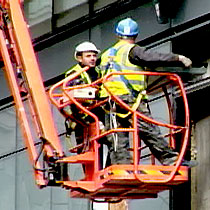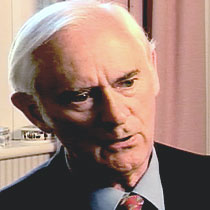2007年VOA标准英语-As Europe Unites, Migrant Workers Spread(在线收听)
London
15 August 2007
A British parliamentary committee has said that tightening restrictions for highly skilled immigrant workers is illegal and unfair and could mean thousands might be deported. Some 50,000 immigrants could be affected, but they are just a small portion of the massive influx of migrant workers who have come to Britain in recent years, especially since the expansion of the European Union in 2004. VOA's Sonja Pace has more from London.
 |
| Britian's building boom attracts immigrants looking for work |
British government statistics indicate that more than two and a half million foreign workers have been registered in Britain since 2002.
The largest single group of immigrants has come from Poland. Zbigniew Cwik is one of them. "When I come here, the first couple of days was very difficult for me because I miss my wife, my family and when I start work, the work was from morning to nearly evening so I am just thinking about the work."
He goes by Zibbi, for short. He originally came on a training course, stayed, found work doing construction and home refurbishments, brought his family over and eventually started his own business.
More than 220,000 Polish workers registered in Britain in the past year. And in all, over 700,000 East European workers have come here since the 2004 EU expansion. The statistics, compiled from the government's National Insurance registry, do not include the number of migrants who have since left Britain.
 |
| Andrew Green |
Most migrants work in unskilled jobs - they sweep streets, tend gardens, build roads.
Andrew Green, chairman of the lobby group, Migration Watch, says, "Polish immigration is great news for the chattering classes - because you get cheap nannies, you get cheap restaurants, you get wonderful gardeners and the plumbers are wonderful. If you happen to be a British plumber it's not so good. We've got a million young (British) people who are not in education, not in training, not in work. Now it's even more difficult to get those people into the work force if you've got literally hundreds of thousands of bright, young Poles ready to do the job."
And so the debate goes on - from pubs and private living rooms to the houses of parliament -- how many migrants should be allowed in, how long should they stay, do they benefit the economy or do they take jobs away from locals?
Hugo Brady says there is another factor. "People will always fear the 'other' and they don't like the idea of strangers descending on them even if it is a good thing, even if they themselves have benefited from it. Somehow this prejudice remains."
For the migrants who come here, the priority is to make a better life for themselves and their families. Some plan to return home, others are not so sure.
For Britons, the issue remains an ongoing debate.